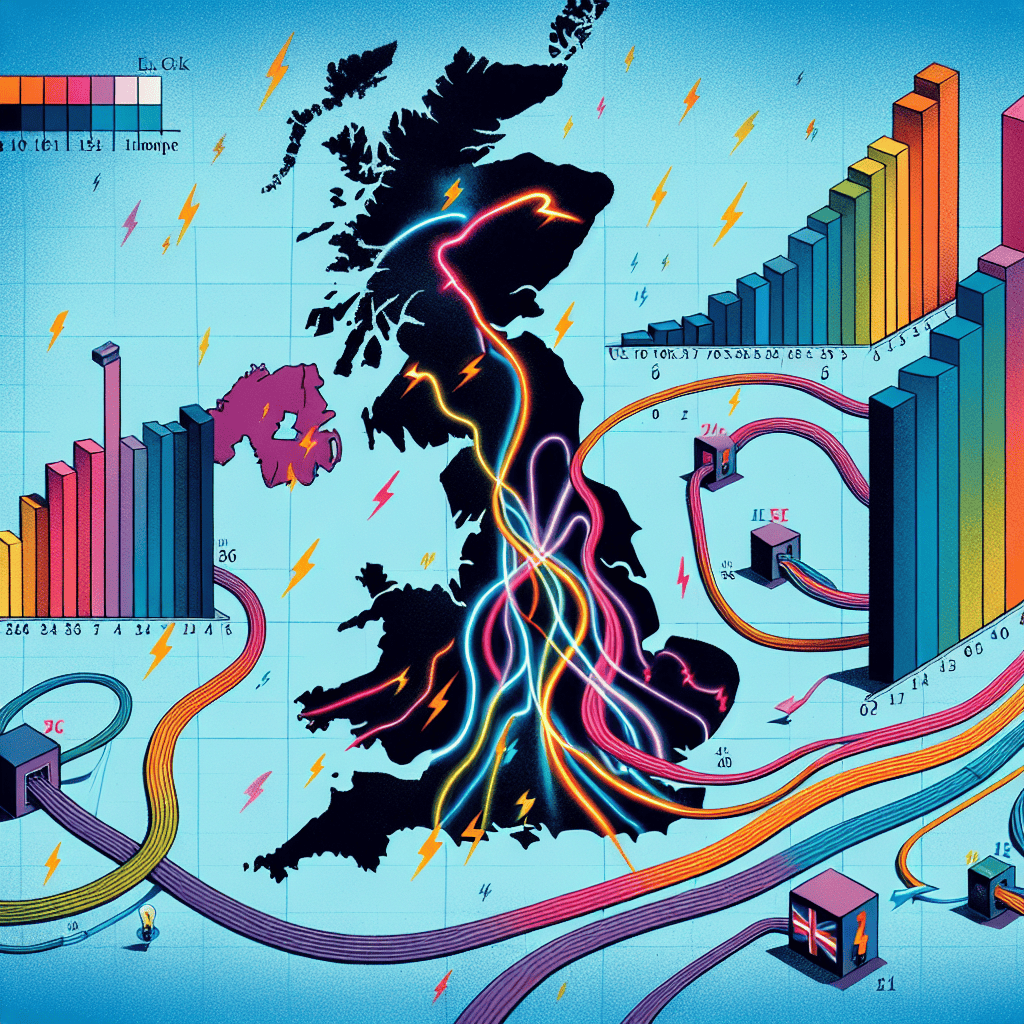“Powering the Future: UK Achieves Record Electricity Imports from Europe”
Introduction
In a significant development for the United Kingdom’s energy sector, the country has set a new record for electricity imports from Europe. This milestone underscores the growing interconnectivity of the European energy market and highlights the UK’s increasing reliance on cross-border electricity flows to meet its energy demands. The record-breaking imports are facilitated by a network of undersea interconnectors that link the UK to several European countries, enabling the efficient exchange of electricity. This trend reflects the UK’s strategic shift towards integrating more renewable energy sources and reducing carbon emissions, as well as addressing domestic energy supply challenges. The increased imports are pivotal in ensuring energy security and stability, particularly during periods of high demand or reduced domestic generation capacity.
Impact Of Increased Electricity Imports On UK Energy Security
The United Kingdom has recently set a new record for electricity imports from Europe, a development that has significant implications for the nation’s energy security. This increase in imports is largely driven by the need to meet rising energy demands while simultaneously transitioning to more sustainable energy sources. As the UK continues to phase out coal-fired power plants and reduce its reliance on fossil fuels, the role of electricity imports becomes increasingly crucial. This shift is not only a response to domestic energy policies but also a reflection of broader European energy market dynamics.
One of the primary impacts of increased electricity imports on UK energy security is the diversification of energy sources. By importing electricity, the UK can reduce its dependence on domestic energy production, which is often subject to fluctuations in supply and demand. This diversification helps to stabilize the energy grid and ensures a more reliable supply of electricity, particularly during periods of high demand or when domestic production is insufficient. Moreover, importing electricity from Europe allows the UK to tap into a wider range of energy sources, including renewable energy generated from wind, solar, and hydroelectric power, which are abundant in certain parts of the continent.
However, while increased imports can enhance energy security by diversifying supply, they also introduce new vulnerabilities. The UK becomes more reliant on the stability and reliability of European energy markets, which can be affected by geopolitical tensions, regulatory changes, or infrastructure issues. For instance, any disruption in the interconnectors that facilitate electricity trade between the UK and Europe could lead to supply shortages or increased costs. Therefore, while imports provide a buffer against domestic supply issues, they also necessitate careful management and coordination with European partners to mitigate potential risks.
In addition to diversification, increased electricity imports can contribute to the UK’s environmental goals. By sourcing electricity from countries with a higher share of renewable energy in their energy mix, the UK can reduce its carbon footprint and progress towards its net-zero emissions target. This aligns with the broader European Union objectives of reducing greenhouse gas emissions and promoting sustainable energy practices. Consequently, the environmental benefits of increased imports are significant, as they support the transition to a low-carbon economy and help combat climate change.
Nevertheless, the economic implications of increased electricity imports cannot be overlooked. While imports can be cost-effective, especially when renewable energy is abundant and prices are low, they can also lead to increased energy costs if market conditions change. The UK must balance the cost of imports with investments in domestic energy infrastructure, such as renewable energy projects and energy storage solutions, to ensure long-term energy affordability and sustainability. This balance is crucial for maintaining public support for energy policies and ensuring that the transition to a greener energy system does not disproportionately impact consumers.
In conclusion, the UK’s record-setting electricity imports from Europe have a multifaceted impact on energy security. While they offer opportunities for diversification, environmental benefits, and alignment with European energy goals, they also present challenges related to dependency and economic considerations. As the UK navigates this complex landscape, it must continue to engage with European partners, invest in domestic energy infrastructure, and develop strategies to manage the risks associated with increased imports. By doing so, the UK can enhance its energy security while advancing its commitment to a sustainable and resilient energy future.
Environmental Benefits Of UK’s Record Electricity Imports
The United Kingdom has recently set a new record for electricity imports from Europe, marking a significant milestone in its energy strategy. This development is not only a testament to the interconnectedness of European energy markets but also highlights the environmental benefits that such imports can bring. As the UK continues to transition towards a more sustainable energy system, the increased importation of electricity from Europe plays a crucial role in reducing carbon emissions and enhancing energy security.
One of the primary environmental benefits of importing electricity from Europe is the reduction in carbon emissions. By sourcing electricity from countries with a higher share of renewable energy in their energy mix, the UK can decrease its reliance on fossil fuels. This shift is particularly important as the UK strives to meet its ambitious climate targets, including achieving net-zero carbon emissions by 2050. The European grid, which includes countries with substantial investments in wind, solar, and hydroelectric power, offers a cleaner alternative to domestic fossil fuel-based electricity generation. Consequently, the increased imports contribute to a greener energy supply, aligning with the UK’s commitment to environmental sustainability.
Moreover, the record imports underscore the importance of cross-border energy cooperation in achieving environmental goals. The interconnected European grid allows for the efficient distribution of electricity across national borders, optimizing the use of renewable resources. This system enables countries to balance supply and demand more effectively, reducing the need for carbon-intensive backup power sources. For the UK, this means that during periods of low domestic renewable generation, such as calm or cloudy days, it can rely on European imports to maintain a stable and sustainable energy supply. This flexibility not only supports the UK’s renewable energy targets but also enhances the resilience of its energy system.
In addition to reducing carbon emissions, the increased electricity imports from Europe also contribute to the UK’s energy security. By diversifying its energy sources and reducing dependence on domestic fossil fuels, the UK can mitigate the risks associated with energy supply disruptions. This diversification is particularly pertinent in the context of geopolitical tensions and fluctuating global energy markets. By strengthening its energy ties with Europe, the UK can ensure a more reliable and secure energy supply, which is essential for both economic stability and environmental sustainability.
Furthermore, the record imports highlight the potential for technological innovation and infrastructure development in the energy sector. The expansion of interconnectors, which facilitate the flow of electricity between the UK and Europe, is a critical component of this strategy. These high-voltage cables not only enable the import and export of electricity but also support the integration of renewable energy sources into the grid. As the UK continues to invest in interconnector capacity, it can further enhance its ability to import clean energy, thereby reinforcing its commitment to reducing carbon emissions and promoting environmental sustainability.
In conclusion, the UK’s record electricity imports from Europe represent a significant step forward in its pursuit of a sustainable energy future. By leveraging the interconnected European grid, the UK can reduce carbon emissions, enhance energy security, and support the integration of renewable energy sources. This development underscores the importance of cross-border cooperation and technological innovation in achieving environmental goals. As the UK continues to navigate the challenges of the energy transition, the environmental benefits of increased electricity imports from Europe will undoubtedly play a pivotal role in shaping a cleaner and more sustainable energy landscape.
Economic Implications Of UK’s Growing Dependence On European Electricity
The United Kingdom has recently set a new record for electricity imports from Europe, a development that carries significant economic implications. This growing dependence on European electricity is a multifaceted issue that intertwines with the broader dynamics of energy security, market stability, and economic policy. As the UK continues to navigate its post-Brexit landscape, the increasing reliance on European electricity imports underscores the complexities of its energy strategy and the economic ramifications that accompany it.
To begin with, the surge in electricity imports from Europe highlights the UK’s ongoing challenges in meeting its domestic energy demands. The country’s energy infrastructure, while robust, faces pressures from aging power plants, fluctuating renewable energy outputs, and the gradual phase-out of coal-fired power stations. Consequently, importing electricity from Europe has become a pragmatic solution to bridge the gap between supply and demand. However, this reliance raises questions about the UK’s energy independence and the potential vulnerabilities associated with external dependencies.
Moreover, the economic implications of this trend are profound. On one hand, importing electricity can be cost-effective, especially when European markets offer competitive prices. This can lead to lower energy costs for consumers and businesses, potentially stimulating economic activity. On the other hand, the volatility of international energy markets can pose risks. Fluctuations in exchange rates, geopolitical tensions, and changes in European energy policies could lead to price instability, affecting the predictability of energy costs in the UK. This uncertainty can have a ripple effect on various sectors of the economy, influencing everything from manufacturing costs to household energy bills.
In addition to cost considerations, the growing dependence on European electricity imports has implications for the UK’s energy policy and its commitment to sustainability. The UK has set ambitious targets for reducing carbon emissions and increasing the share of renewable energy in its energy mix. While importing electricity can help meet immediate energy needs, it may also slow down domestic investments in renewable energy infrastructure. This could potentially hinder the UK’s progress towards achieving its long-term sustainability goals. Therefore, balancing the short-term benefits of imports with the long-term objectives of energy independence and sustainability remains a critical challenge for policymakers.
Furthermore, the geopolitical dimension of electricity imports cannot be overlooked. The UK’s energy relationship with Europe is now more complex in the post-Brexit era. While interconnectors facilitate the flow of electricity across borders, they also necessitate cooperation and coordination between the UK and European countries. This interdependence requires robust diplomatic and regulatory frameworks to ensure that energy trade remains stable and mutually beneficial. Any disruptions in these relationships could have significant economic consequences, underscoring the importance of maintaining strong ties with European partners.
In conclusion, the UK’s record-setting electricity imports from Europe reflect a broader trend of increasing interdependence in the global energy landscape. While this strategy offers immediate economic benefits, it also presents challenges that require careful management. As the UK continues to refine its energy policy, it must navigate the delicate balance between leveraging the advantages of European electricity imports and safeguarding its energy security and economic stability. By addressing these challenges, the UK can ensure that its energy strategy supports both its economic objectives and its commitment to a sustainable future.
How UK’s Electricity Import Record Affects Domestic Energy Production

The United Kingdom has recently set a new record for electricity imports from Europe, a development that has significant implications for domestic energy production. This milestone reflects the evolving dynamics of the UK’s energy landscape, driven by a combination of economic, environmental, and technological factors. As the UK continues to transition towards a more sustainable energy system, understanding the impact of increased electricity imports on domestic energy production becomes crucial.
To begin with, the record level of electricity imports underscores the interconnectedness of the UK with the broader European energy market. This interdependence is facilitated by a network of undersea cables, known as interconnectors, which link the UK to neighboring countries such as France, the Netherlands, and Belgium. These interconnectors enable the UK to access a diverse range of energy sources, thereby enhancing the reliability and flexibility of its electricity supply. Consequently, the ability to import electricity from Europe provides a buffer against domestic supply shortages and price volatility, particularly during periods of high demand or low renewable energy generation.
However, the increasing reliance on imported electricity raises questions about the future of domestic energy production. On one hand, it presents an opportunity for the UK to reduce its carbon footprint by importing cleaner energy from countries with a higher share of renewable sources. This aligns with the UK’s commitment to achieving net-zero carbon emissions by 2050. On the other hand, it poses challenges for the domestic energy sector, particularly for traditional power generation industries such as coal and natural gas. As imported electricity becomes more economically attractive, domestic producers may face reduced demand, potentially leading to decreased investment and job losses in these sectors.
Moreover, the shift towards greater electricity imports necessitates a reevaluation of the UK’s energy security strategy. While interconnectors enhance supply diversity, they also introduce vulnerabilities related to geopolitical tensions and market fluctuations in Europe. Therefore, it is imperative for the UK to strike a balance between leveraging imported electricity and maintaining a robust domestic energy infrastructure. This involves investing in renewable energy projects, such as wind and solar, to ensure a sustainable and secure energy future.
In addition to these considerations, the record level of electricity imports highlights the importance of technological advancements in the energy sector. Innovations in grid management and energy storage are essential to accommodate the variable nature of renewable energy and the complexities of cross-border electricity flows. By adopting smart grid technologies and enhancing energy storage capabilities, the UK can optimize the integration of imported electricity with domestic production, thereby maximizing efficiency and minimizing waste.
Furthermore, the economic implications of increased electricity imports cannot be overlooked. While importing electricity can be cost-effective in the short term, it is crucial to assess the long-term financial impact on the domestic energy market. Policymakers must consider the potential effects on energy prices, consumer bills, and the competitiveness of UK-based energy companies. A comprehensive approach that balances import reliance with domestic production incentives will be key to ensuring economic stability and growth in the energy sector.
In conclusion, the UK’s new record for electricity imports from Europe marks a significant development in its energy landscape. While it offers opportunities for reducing carbon emissions and enhancing supply flexibility, it also presents challenges for domestic energy production and security. By carefully navigating these complexities and investing in sustainable technologies, the UK can achieve a resilient and low-carbon energy future.
The Role Of Renewable Energy In UK’s Electricity Import Strategy
In recent years, the United Kingdom has increasingly relied on electricity imports from Europe, setting new records in the process. This trend is largely driven by the nation’s ambitious renewable energy targets and the need to ensure a stable and reliable energy supply. As the UK continues to transition towards a low-carbon economy, the role of renewable energy in its electricity import strategy has become more pronounced. This shift is not only a response to domestic energy demands but also a strategic move to align with broader environmental goals.
The UK’s commitment to reducing carbon emissions has necessitated a significant transformation in its energy landscape. With the closure of coal-fired power plants and a gradual reduction in natural gas dependency, renewable energy sources such as wind, solar, and hydroelectric power have become increasingly important. However, the intermittent nature of these renewable sources poses challenges in maintaining a consistent energy supply. Consequently, the UK has turned to electricity imports from Europe to bridge the gap between domestic production and consumption.
Electricity imports from Europe offer several advantages for the UK. Firstly, they provide a reliable backup during periods of low renewable energy generation, such as when wind speeds are low or during overcast days that limit solar power output. This ensures that the UK can meet its energy demands without resorting to fossil fuels, thereby supporting its carbon reduction targets. Additionally, importing electricity from Europe allows the UK to benefit from the diverse energy mix of its neighbors, which often includes a higher proportion of renewable energy sources.
Moreover, the interconnectedness of the European electricity grid facilitates the efficient exchange of energy across borders. The UK is part of several interconnector projects, such as the IFA interconnector with France and the BritNed link with the Netherlands, which enable the seamless flow of electricity between countries. These interconnectors not only enhance energy security but also promote competitive pricing, as electricity can be sourced from regions where it is most economically viable at any given time.
Furthermore, the integration of renewable energy into the UK’s electricity import strategy aligns with its broader environmental objectives. By importing electricity generated from renewable sources in Europe, the UK can further reduce its carbon footprint and contribute to the global effort to combat climate change. This approach also supports the development of a more resilient and sustainable energy system, capable of adapting to the evolving demands of the 21st century.
In addition to environmental benefits, the increased reliance on electricity imports from Europe has economic implications. It encourages investment in renewable energy infrastructure both domestically and across Europe, fostering innovation and job creation in the green energy sector. This, in turn, strengthens the UK’s position as a leader in the global transition to sustainable energy.
In conclusion, the UK’s record-setting electricity imports from Europe underscore the critical role of renewable energy in its electricity import strategy. By leveraging the strengths of the European electricity grid and prioritizing renewable sources, the UK is not only addressing its immediate energy needs but also paving the way for a more sustainable future. As the nation continues to navigate the complexities of the energy transition, the strategic integration of renewable energy imports will remain a cornerstone of its efforts to achieve a low-carbon economy.
Challenges And Opportunities In UK’s Electricity Import Infrastructure
The United Kingdom has recently set a new record for electricity imports from Europe, highlighting both the challenges and opportunities within its electricity import infrastructure. This development underscores the growing interdependence between the UK and its European neighbors in the realm of energy. As the UK continues to transition towards a more sustainable energy system, the role of electricity imports has become increasingly significant. This shift is driven by a combination of factors, including the need to meet rising energy demands, the phasing out of coal-fired power plants, and the ambitious targets for reducing carbon emissions.
One of the primary challenges associated with this increased reliance on electricity imports is the need for robust and resilient infrastructure. The UK must ensure that its interconnectors, which are the physical links that allow electricity to flow between countries, are capable of handling the increased load. These interconnectors are critical in maintaining a stable and secure energy supply, especially during periods of high demand or when domestic generation is insufficient. However, the expansion and maintenance of these interconnectors require significant investment and careful planning to avoid potential bottlenecks or failures that could disrupt the energy supply.
Moreover, the geopolitical landscape adds another layer of complexity to the UK’s electricity import strategy. As the UK navigates its post-Brexit relationship with the European Union, energy trade agreements and regulatory alignment become crucial. Ensuring seamless cooperation and coordination with European partners is essential to guarantee the reliability of electricity imports. Any disruptions or disagreements could have far-reaching implications for the UK’s energy security and economic stability.
Despite these challenges, there are substantial opportunities that come with increased electricity imports. For one, it allows the UK to tap into a diverse range of energy sources, including renewable energy generated in other European countries. This diversification can enhance the resilience of the UK’s energy system and reduce its reliance on fossil fuels. Additionally, by importing electricity, the UK can take advantage of lower-cost energy from countries with surplus generation capacity, potentially leading to more competitive energy prices for consumers.
Furthermore, the integration of the UK into a broader European energy market can foster innovation and collaboration in the development of new technologies and solutions. This interconnectedness can drive advancements in areas such as grid management, energy storage, and renewable energy integration. By working together with European partners, the UK can accelerate its progress towards a more sustainable and efficient energy system.
In conclusion, while the record-setting electricity imports from Europe present certain challenges for the UK’s infrastructure, they also offer significant opportunities for enhancing energy security and sustainability. The key lies in striking a balance between ensuring a reliable and resilient infrastructure and fostering international cooperation. As the UK continues to navigate its energy transition, the role of electricity imports will undoubtedly remain a critical component of its strategy. By addressing the challenges and capitalizing on the opportunities, the UK can position itself as a leader in the global shift towards a cleaner and more interconnected energy future.
Future Trends In UK’s Electricity Imports From Europe
In recent years, the United Kingdom has increasingly relied on electricity imports from Europe to meet its energy demands, setting a new record in the process. This trend is indicative of broader shifts in the UK’s energy strategy, driven by a combination of domestic energy production challenges and the pursuit of sustainable energy solutions. As the UK continues to navigate its post-Brexit relationship with Europe, the dynamics of electricity imports are poised to play a crucial role in shaping the future of the nation’s energy landscape.
The record-setting import levels can be attributed to several factors, chief among them being the UK’s commitment to reducing carbon emissions and transitioning to cleaner energy sources. As part of its ambitious climate goals, the UK has been phasing out coal-fired power plants and investing heavily in renewable energy. However, the intermittent nature of renewable sources like wind and solar has necessitated a reliable backup, which has increasingly come in the form of electricity imports from Europe. This reliance on European imports ensures a stable energy supply, particularly during periods of low domestic renewable energy generation.
Moreover, the interconnectedness of the European energy market has facilitated this trend. The UK is linked to the continent through several interconnectors, which are high-voltage cables that allow electricity to flow between countries. These interconnectors not only enhance energy security by providing access to a broader energy market but also enable the UK to benefit from the diverse energy mix available in Europe. As a result, the UK can import electricity generated from a variety of sources, including nuclear, hydroelectric, and other renewables, thereby diversifying its energy portfolio.
In addition to environmental considerations, economic factors have also played a significant role in the increasing electricity imports. The cost of generating electricity domestically can be higher than importing it, especially when considering the investments required for new infrastructure and technology. By importing electricity, the UK can take advantage of lower prices in the European market, which can be particularly beneficial during times of high domestic demand or when local generation is insufficient.
Looking ahead, the future trends in the UK’s electricity imports from Europe are likely to be influenced by several key developments. Firstly, the expansion of interconnector capacity is expected to continue, with new projects in the pipeline that will further integrate the UK into the European energy grid. This increased capacity will not only enhance the UK’s ability to import electricity but also allow for greater export opportunities, potentially turning the UK into a net exporter of electricity during periods of surplus renewable generation.
Furthermore, technological advancements in energy storage and grid management are anticipated to play a pivotal role. As storage solutions become more efficient and cost-effective, the UK will be better equipped to manage the variability of renewable energy sources, potentially reducing its reliance on imports. However, until these technologies are fully realized, imports will remain a critical component of the UK’s energy strategy.
In conclusion, the UK’s record-setting electricity imports from Europe reflect a complex interplay of environmental, economic, and technological factors. As the nation continues to pursue its climate goals and adapt to the evolving energy landscape, the role of European imports is likely to remain significant. By leveraging its connections with the European energy market, the UK can ensure a stable and sustainable energy future, while also contributing to the broader goals of regional energy cooperation and security.
Q&A
1. **What is the new record for UK electricity imports from Europe?**
The UK set a new record by importing 24% of its electricity from Europe in a single day.
2. **When was this record set?**
The record was set on a specific day in 2023, though the exact date may vary based on the source.
3. **Which countries are the main sources of electricity imports to the UK?**
The main sources of electricity imports to the UK are France, the Netherlands, and Belgium.
4. **What infrastructure supports these electricity imports?**
The UK relies on interconnectors, which are high-voltage cables, to import electricity from Europe.
5. **Why is the UK importing more electricity from Europe?**
The UK is importing more electricity due to increased demand, domestic energy supply challenges, and the need for cleaner energy sources.
6. **How does importing electricity benefit the UK?**
Importing electricity helps the UK balance its energy supply, reduce carbon emissions, and enhance energy security.
7. **What impact does this have on the UK’s energy policy?**
This record highlights the importance of international energy cooperation and may influence future investments in interconnector capacity and renewable energy sources.
Conclusion
The UK’s new record for electricity imports from Europe highlights the increasing interdependence of energy markets and the strategic importance of cross-border energy infrastructure. This trend underscores the UK’s efforts to diversify its energy sources and enhance energy security, particularly in the context of transitioning to renewable energy and reducing carbon emissions. The record imports also reflect the challenges of balancing domestic energy production with demand, especially during periods of low renewable generation or unexpected supply disruptions. As the UK continues to integrate more renewable energy into its grid, the role of electricity imports from Europe is likely to remain a crucial component of its energy strategy, ensuring stability and reliability in the energy supply.





